Waking up to news of caste-based violence every second day, fighting for social justice amid an environment where therapy remains a stigma and its affordability a huge question for vulnerable communities, it leaves an impact on mental health.
Divya Malhari, a Dalit teacher and writer told FIT, “I am not taking care of my mental health. I have anxiety, I get panic attacks. Ever since I got to know about the Hathras case, I haven't been able to sleep. It's only now that there's more visibility and people are remotely talking about it. But even this will vanish very soon.”
The Hathras case and the systemic violence without redressal has left many from the Dalit community reeling.
But here, our conversation must go beyond the need for therapy and move towards comprehending the complexities of mental health amid the community.
When Recognising Mental Illness Becomes an Issue
Kiruba Munusamy, a senior lawyer in the Supreme Court, got survivor’s guilt when she heard about the Hathras case. She points out how difficult it is to navigate mental health problems in marginalised communities.
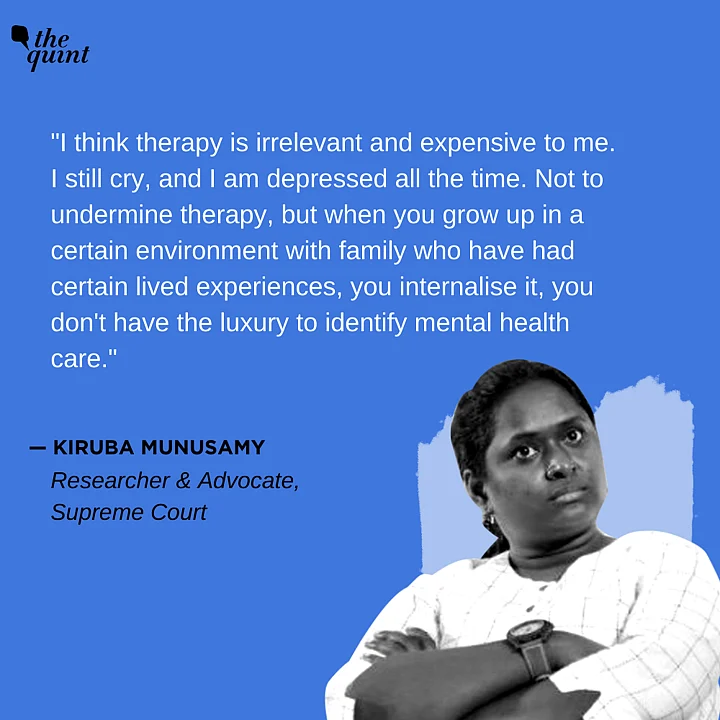
She adds that the problems that Dalits face are interlinked with caste identity, unemployment and politics. “Most Dalit women are dealing with or managing multiple issues simultaneously. In garment industries, they are exploited even during menstruation. Where does their mental health go?”
Manisha Mashaal is an anti-caste and grassroots activist in Haryana who has worked with Dalit girls and women through her foundation ‘Swabhiman Society’.
In her 15 years of experience, she notes that the victims of caste-based violence or sexual assault are not provided proper counselling when they need it the most. She recalled:
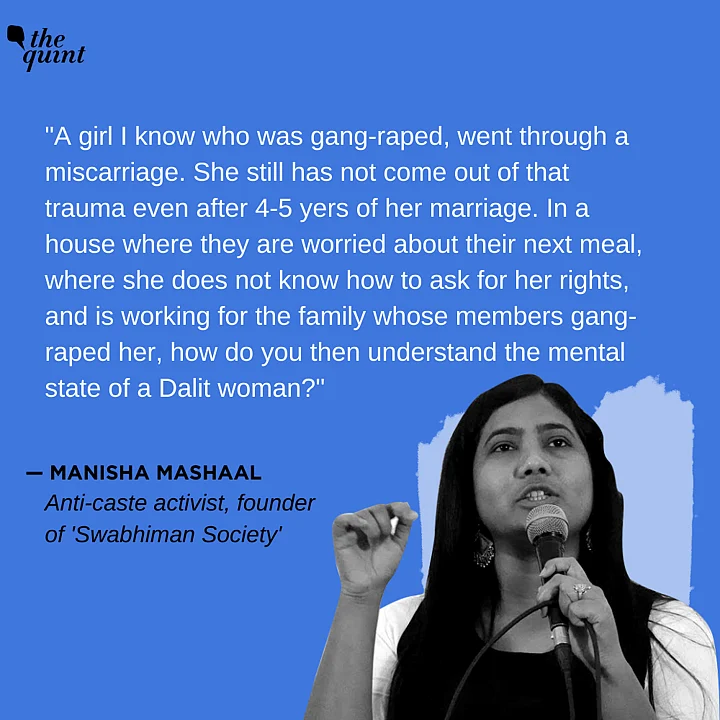
Moreover, the pandemic and its subsequent economic impact has left the community dealing with more immediate concerns.
Mashaal pointed out, “Amid the coronavirus pandemic, many Dalits lost their jobs, especially those who worked as domestic helps. Many of them called us and they were barely surviving on water. We used to borrow ration and provide them somehow. A lot of Dalit women, who are manual scavengers, got coronavirus, their physical well being was not taken care of properly, let alone mental health.”
Talking about Dalits in rural areas, Malhari elaborated,
“To make them understand that there is nothing inferior about them is to undo what 25 years of their life has been. This happens with urban Dalits too, so imagine in rural areas where if a lower caste woman refuses to wash menstruating clothes of an upper caste woman, she can be punished, even raped. How do you explain the idea of self-respect and mental health care to them?”
She speaks about her own experience of facing discrimination in a college in Bengaluru, where she said that she was forced to pen down her name, caste, sub-caste, religion and date of birth on a diary.
Trauma, Strength Through the Years
Mashaal said that she was made to recognise her caste when she was in the third standard. She faced discrimination in school through the staff, being called ‘chamaar,’ and ‘chor.’ Contrary to what she thought, the discrimination also continued in college. But she could not talk to her parents about this.
“I couldn’t tell my parents what I faced when I was small, because I used to see that they went through the same experiences too. So I thought if they didn’t talk about it, why should I? I was also scared that I might have to leave school.”
Mashaal said that because she is surrounded by victims and their trauma 24x7, the only person she can share her anxieties with is her sister, who also works with her. That is her own way of healing.
All of them agree that there is a lot of emotional and mental labour that goes into explaining to people about the caste system, marginalisation and the trauma, even to those who want to be allies.
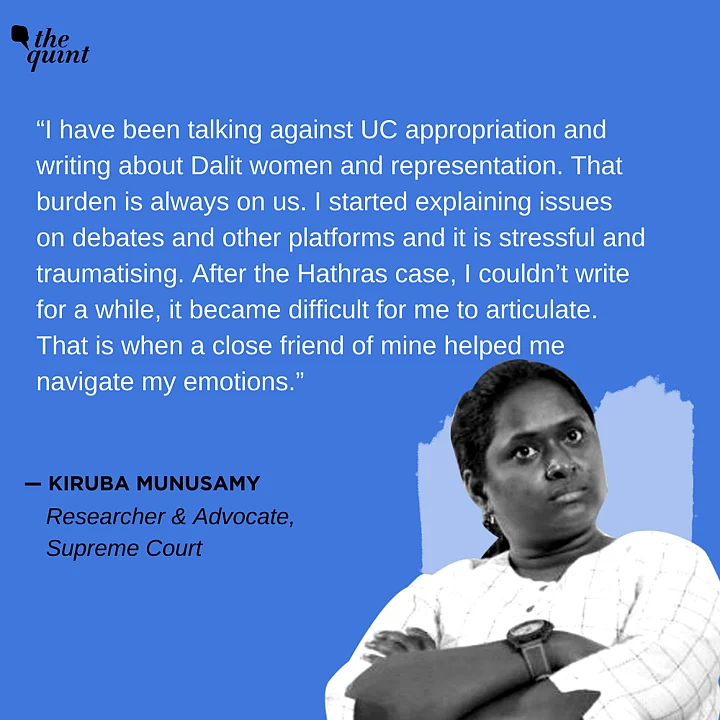
Another aspect is the intergenerational trauma that we do not talk about.
Malhari noted, “The onus is not on the parents to talk about caste to their children because upper-caste families do not talk about the caste system with their kids, they just talk about how to behave or treat people of lower caste.”
Apart from the trauma, she has also gained immense strength from her ancestors.
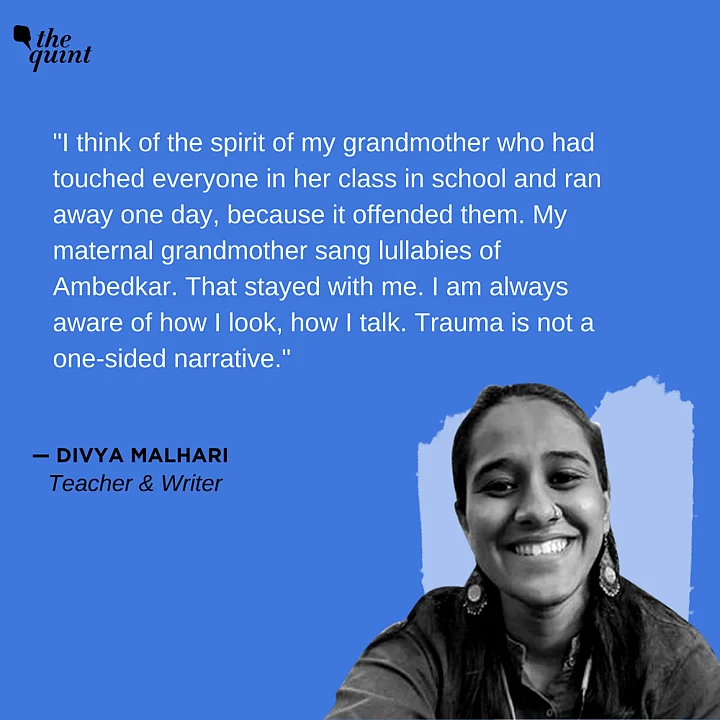
Where We Are Fault When We Talk About Mental Health of Dalits
India is home to over 300 million Dalits. Every second person belonging to Scheduled Tribes and every third person belonging to Scheduled Castes remains poor, according to a UN report. The report defines poor not just on the basis of income, but also on other factors such as nutrition, health, education, living standards and assets.
So, then when we talk about mental health care, we must also talk about this context, and the systems that have perpetuated oppression through the years that must be blamed and held accountable.
Arjun Kapoor, a lawyer and a psychologist told FIT, “Address the oppressor communities making them feel that way rather than addressing people who are feeling that way,” noting that mental health is a right under Section 18 of the Mental Healthcare Act, and that is why the state and the Centre must intervene.
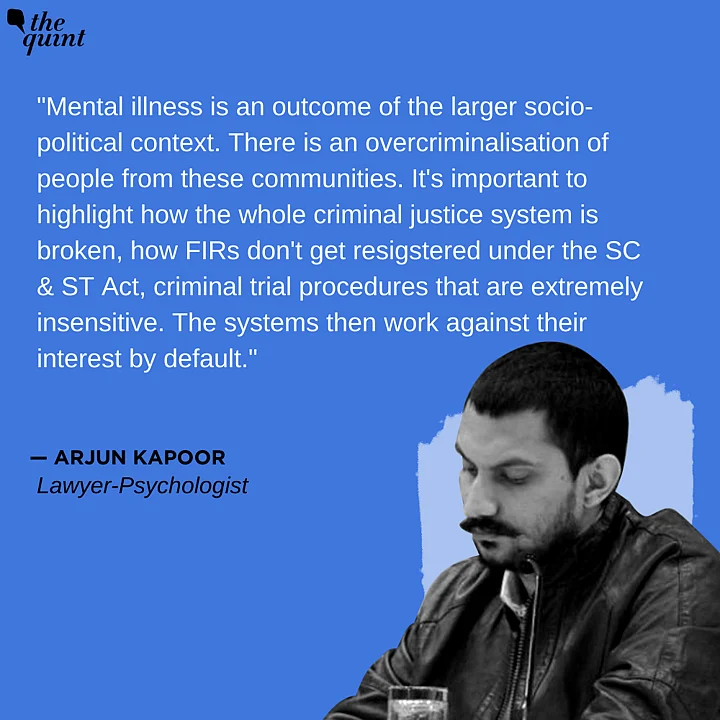
Everybody we spoke with said that the conversation must not just be that 'DBA communities have mental health problems.’ That is what happened in Rohith Vemula's and Payal Tadvi's case. The focus was taken away from the system of oppression, from those who should be held accountable in the media.
They also emphasise on the need for therapists from the Dalit community. It would not just help them, but also empower them with representation.
Malhari said, “Therapy for Dalits needs to be tailor-made. There are experiences they might have in common, and they will still be different or expressed differently.”
Furthermore, psychologist Kapoor said, “One of the key aspects of therapeutic work, regardless of their background, is the ability of the therapist to forge a therapeutic alliance with that person. The therapist/psychologist needs to understand the lived experience of that person, and even Dalits, Bahujan do not have homogenous identities or experiences. They are communities with their own history and experiences and socio-political dynamics.”
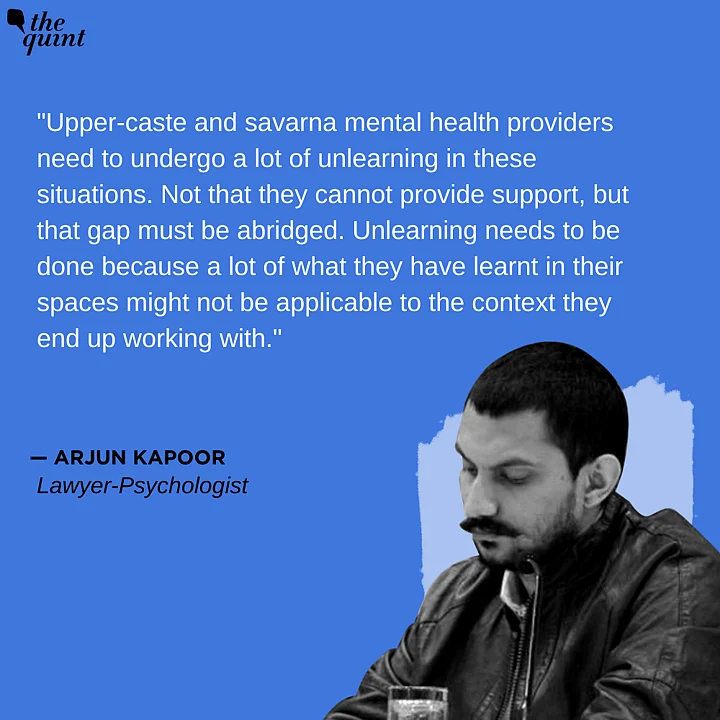
So, What Can Be Done on the Ground Level?
Now, where does the change begin? With upper-caste institutions and communities actively understanding the fault lines and problems they have perpetuated? Yes. But, there’s more.

Lack of investment and expenditure also poses a huge problem. Kapoor pointed out, “We are still spending less than 0.5 percent of the health budget on mental healthcare. The National Mental Health Programme's budget came down to 40 crores in 2019. To provide all the facilities under the Mental Healthcare Act, there is an estimated expenditure of 90,000 crores. We are light years away, a different galaxy in terms of investment.”
This is why, he states that the communities must be empowered with basic tools and skills to identify mental health problems and provide specific targeted support and then shift to the formal health care system if there are severe cases.
Funding societies and civil groups must also change their agendas to help these communities.
In this context comes Therapize India, a recent venture on Instagram that focuses on making healthcare more affordable, accessible and transparent.
Aviva Bhansali, one of the founders of the platform, said, “Only if stigma is removed can you move towards conversing about affordability/accessibility. We have come a long way but given our demography and diversity, and their vulnerabilities, the demand for such services is so high that the supply is nowhere able to meet that.”
Bhansali is a researcher who launched the platform in September, after going through around 300 applications. When it comes to DBA communities, she said:
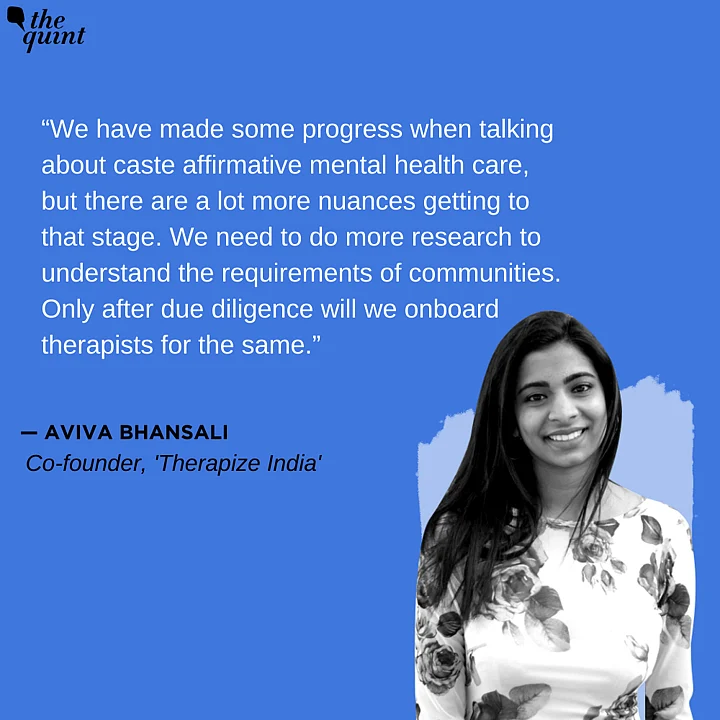
So, the next time you engage about mental health issues of Dalits with anybody, especially someone from the community, make sure you do your homework of the context and the sensibilities. More importanly, conversations around mental health are not a hot take or a trend that you follow and forget, and it is definitely not something that you just talk about for a day or two.
(This story was originally published on The Quint’s FIT platform).
(At The Quint, we are answerable only to our audience. Play an active role in shaping our journalism by becoming a member. Because the truth is worth it.)
